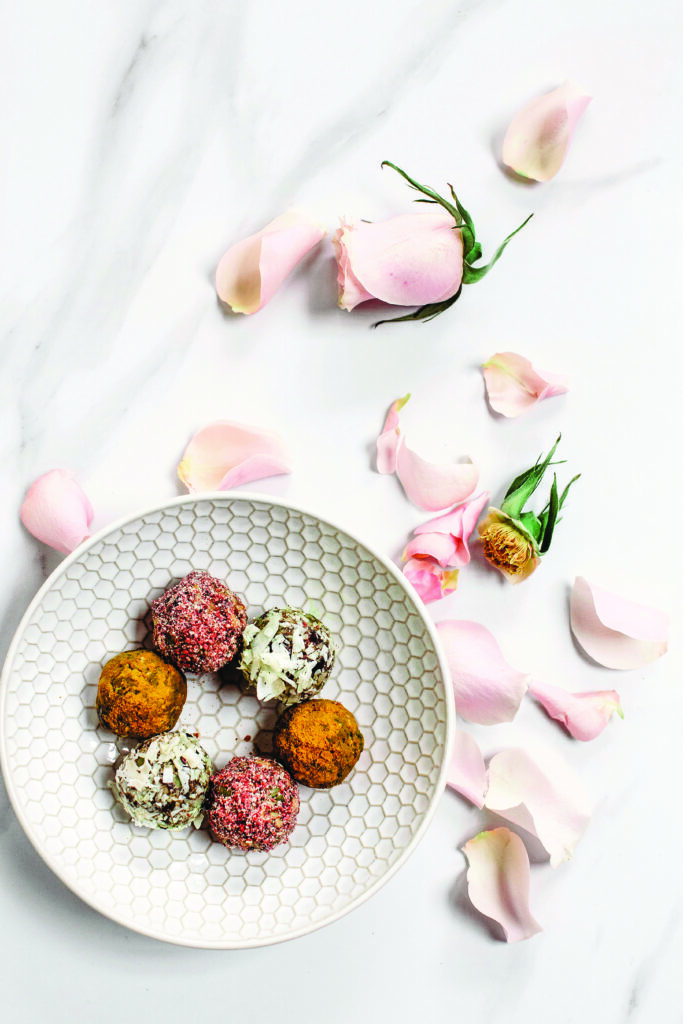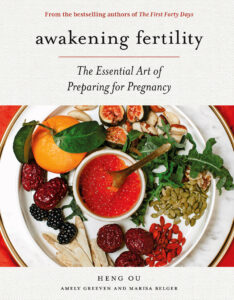
Strengthening your relationship with food is more important during the prelude to pregnancy than at any other phase in your life, save, perhaps, for the 40 weeks of gestation itself. It starts with a choice: I choose to feed myself well! Because here’s the obvious but sometimes little-discussed reality of making a baby: Every aspect of reproduction requires an abundance of energy and high-grade raw materials, and they’re derived from food. The monthly creation and orchestration of hormones like estrogen and progesterone depend on well-digested, healthy natural fats, amino acids from proteins, as well as vitamins and minerals.
For these sex hormones to stay at proper levels and ratios, a steady stream of fiber-filled and detoxifying plant foods is required to help the liver do its essential clearing and synthesizing work. The plush lining of a welcoming baby room (the uterus) flourishes when blood is “strong,” as traditionalists say—fortified with iron and other minerals—made by a spleen system working at its best. (It also helps to ensure correct levels of warming progesterone.) None of this happens by magic or sheer intention; it takes continuous material input, actual building blocks delivered via the food that you choose to eat.
The nutritional requirements for even getting up to the starting line of pregnancy are nothing to sneeze at. Yet building yourself up before pregnancy shouldn’t be a relentless, single-minded project like a quarterback working overtime to bulk up and make the team. It shouldn’t give you anxiety that you aren’t doing it “right.” Sages in my family’s tradition teach that fear weakens the kidney organ system—the very aspect we want to strengthen for procreation. Furthermore, fretting hurts the spleen, and without our dear spleen calmly and reliably assisting in digesting our food, we’re up the creek without a paddle. So a big breath and a serving of balance is in order. Consider that eating is a multidimensional act: It’s about the physical nutrients you absorb and assimilate into your blood and tissues, and it’s about the invisible vitality or chi they hold that feeds your chi, your personal vitality. Ask anyone well-versed in acupuncture, Ayurveda or energy medicine, and they’ll even tell you that the vitality of food is influenced by your intention as you prepare it.

The best way to approach this is to start early. Begin to eat as if you were pregnant months or years before you seek to conceive, cleaning out the foods that deplete or tax your system and filling your plate with foods that help, heal and strengthen. So many women are starting out depleted today, struggling with some combination of adrenal fatigue, excessive stress, weak digestion or the depletions of key nutrients. On top of that, so much of our food is grown or processed in ways that strip it of nutrition, and then cocktails of contaminants from the air, water and soil get layered in, too. Fortify yourself ahead of the game and you get plenty of time to address depletions, discover the foods that serve your body best, and kick bad habits to the curb.
Crucially, starting early lets you gradually transition into a healthy prenatal diet. You don’t have to pivot at the last minute—I’m pregnant! What do I eat now?—or make an awkward U-turn.
If starting early isn’t an option—maybe you’re set on making a baby just a few short months from now—know that the foods you and your partner eat today will greatly influence the health of the sperm that is presently forming and that might meet its destined egg in three months, which is really the bare minimum of time to dial up your diet for optimal benefits. That egg is presently starting its important three-month maturation or ripening phase in the follicle, too. Meanwhile, you’ll want to be working hard at building the reserves a growing baby will require: Experts say it takes about three months to build great reserves of folate, a B vitamin pivotal for early fetal development, and our wise ones who practice Chinese medicine say that in three months of eating to serve weak organs, significant cycle rebalancing often occurs. Every bite counts!
Jing Chai
“Life Force” Milk
Serves 2
This milk is the mother lode of jing- and ojas-supportive ingredients—dates, spices, ginger and honey infused into warm, rich milk. Turmeric calms inflammation and supports the liver; reishi strengthens immunity; ashwagandha helps balance hormones. Let yourself sink into a state of relaxation as you take time to care for yourself—offer your partner a mug, too, and enjoy taking care of each other.
Ingredients:
4 cups whole-fat milk or organic almond milk
1 (½-inch) knob fresh
ginger, grated
1 medjool date, deseeded, finely chopped
½ teaspoon cinnamon powder
½ teaspoon cardamom powder
¼ teaspoon turmeric powder
¼ teaspoon ashwagandha powder (optional)
¼ teaspoon reishi powder (optional)
½ teaspoon honey
Instructions:
Heat milk in a small pot over medium heat, then add ginger, medjool date, and cinnamon, cardamom and turmeric powders. Bring to a medium-low boil, then reduce to a light simmer for 10 minutes.
Stir in the ashwagandha and reishi, if using, and steep for another 10 minutes.
Strain, add honey, and sip warm.





